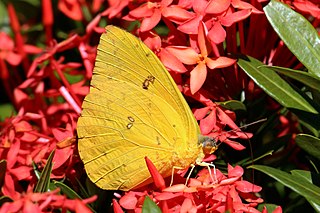
Phoebis sennae, the cloudless sulphur, is a mid-sized butterfly in the family Pieridae found in the Americas. There are several similar species such as the yellow angled-sulphur, which has angled wings, statira sulphur, and other sulphurs, which are much smaller. The species name comes from the genus Senna to which many of the larval host plants belong.

Cepora nerissa, the common gull, is a small to medium-sized butterfly of the family Pieridae, that is, the yellows and whites, which is native to Sri Lanka, India, China, southeast Asia, and Indonesia.

Belenois aurota, the pioneer or pioneer white or caper white, is a small to medium-sized butterfly of the family Pieridae, that is, the yellows and whites, which is found in South Asia and Africa. In Africa, it is also known as the brown-veined white, and is well known during summer and autumn when large numbers migrate north-east over the interior.
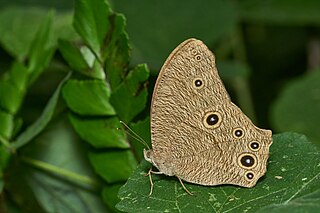
Melanitis leda, the common evening brown, is a common species of butterfly found flying at dusk. The flight of this species is erratic. They are found in Africa, South Asia and South-east Asia extending to parts of Australia.

Ixias marianne, the white orange tip, is a small butterfly of the family Pieridae, found in India and Sri Lanka.

Appias lalage, the spot puffin, is a small butterfly of the family Pieridae, that is, the yellows and whites, which is found in India, Indochina and Hainan.

Appias indra, the plain puffin, is a small butterfly of the family Pieridae, that is, the yellows and whites, which is found in south and southeast Asia.

Appias libythea, the striped albatross, is a small butterfly of the family Pieridae, that is, the yellows and whites, which is found in south and southeast Asia.
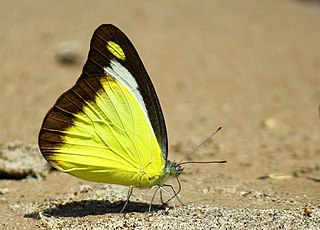
Appias lyncida, the chocolate albatross, is a butterfly of the family Pieridae, that is, the yellows and whites, which is found in south and southeast Asia.
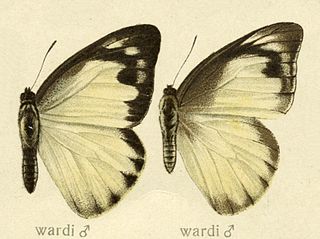
Appias wardii, the Indian albatross or Ward's albatross, is a small butterfly of the family Pieridae, that is, the yellows and whites, which is found in India.
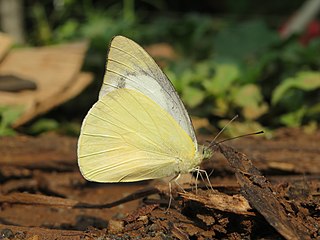
Appias albina, the common albatross, is a small butterfly of the family Pieridae. It is found in south and southeast Asia to Australia.

Jamides kankena, the glistening cerulean, is a small butterfly found in India that belongs to the lycaenids or blues family.

Ancyloxypha numitor, the least skipper, is a North American butterfly in the family Hesperiidae. They have a weak, Satyrinae-like flight.
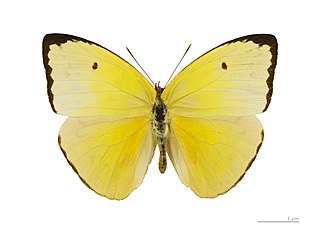
Aphrissa statira, the statira sulphur, is a species of Lepidoptera in the family Pieridae. The species is a medium-sized yellow butterfly, with females more pale than males. They are found from southern regions of Florida and Texas through southern Brazil and northern Argentina. The caterpillars feed on the leaves of several local host plants, while adults prefer to feed on the nectar of red or orange colored flowers. The species is most noted for their dramatic migrations in the tropical areas of the Americas. They have been the subject of many studies about how butterflies navigate and orient during migration.
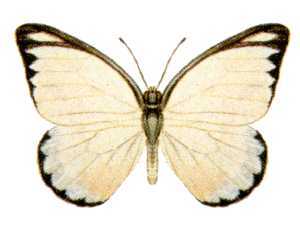
Appias ada, the rare albatross, is a butterfly of the family Pieridae. It is found on the Moluccas, New Guinea, Indonesia, Australia and the Solomon Islands.

Protogoniomorpha parhassus, the forest mother-of-pearl or common mother-of-pearl, is a species of Nymphalidae butterfly found in forested areas of Africa.

Parides sesostris, the emerald-patched cattleheart or southern cattleheart, is a species of butterfly in the family Papilionidae.

Pyrisitia nise, the mimosa yellow, is a butterfly in the family Pieridae. It is found from Argentina north to the Texas Gulf Coast and throughout central and southern Florida, northward to the Tennessee Valley. It is an occasional stray to central Texas and south-eastern Arizona and rarely to southern California, southern Colorado and Kansas. The habitat consists of brushy woodland edges.

Precis pelarga, the fashion commodore, is a species of butterfly in the family Nymphalidae which is native to tropical sub-Saharan Africa.

Appias galene, the Sri Lankan lesser albatross, is a species of Pieridae. It is endemic to Sri Lanka.






















